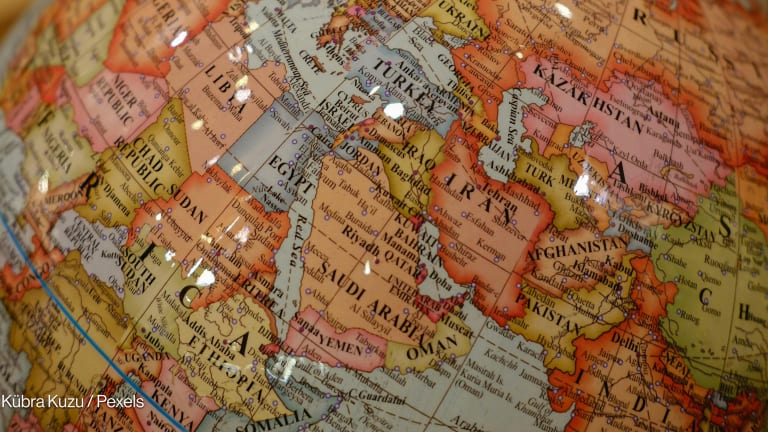UNDP taps local talent for Lebanon projects
<p>The United Nations Development Program relies mainly on Lebanese nationals to run its projects in the Middle Eastern country. But there are still opportunities for expats, says UNDP Resident Representative Marta Ruedas.</p>
The United Nations Development Program hires mostly locals for its projects in Lebanon. According to UNDP Resident Representative Marta Ruedas, the U.N. organization turns to foreign experts only if qualified professionals are not available locally and when assignments require political neutrality. The Spanish native, who is also the U.N. resident coordinator in Beirut, said expatriates may also be engaged by UNDP through the Junior Professional Officer Program, if they come from a sponsoring nation. Ruedas spoke with Devex in October 2009, a month prior to the formation of the unity government in Lebanon. November also saw the launching of Live Lebanon, which enables Lebanese living abroad to support development projects in their homeland through direct donations. Ruedas shared what it would take for individuals to be hired and for organizations to be considered for partnership by UNDP. She also offered advice to those who hope to start a career in international development. What are some of the current and future projects in Lebanon? We have a $40 million-a-year portfolio, so there’s quite a number of different projects. One we did and which is still ongoing is that we had a project to support the government in the conduct of the parliamentary elections that took place in June of this past year. The reason it’s still ongoing is that it still will continue on through the municipal elections, which are scheduled to take place in late spring of next year. But given the current deadlock in the formation of the government, I’m not sure whether that will be postponed. In any case, it will still go onto that. The project itself was preceded by another one that was helping the process of reform of the electoral law. It’s gone from the formulation of an electoral law and the discussion in parliament and in society on the electoral law, through the implementation of parliamentary elections, and then to the municipal elections. That’s one that is ongoing. One that is about to start - we’re actually just launching on November 12th a project called Live Lebanon, which is intended to try and link the Lebanese diaspora [Lebanese living abroad] with community-level development projects in Lebanon. At the moment, somewhere around $6 billion a year comes in through remittances from the Lebanese diaspora. Most of those remittances will not go through this, nor is it intended that we do that. The primary focus of the Lebanese emigrant is the family. But once the family gets taken care of, there is an interest on the part of migrants in general to try to get the community, the municipality, to get upgraded. We have a number of projects. We work with nearly 300 municipalities in Lebanon on local community-level development projects. Much of what migrants send to the community does not actually result in development. It’s the construction of some hall or something, which doesn’t really make the community much better off, economically or socially speaking. We’re trying to match up the goodwill that exists abroad towards local community-level development with an actual engagement on development that we have ongoing with the communities, and we hope that this results in some interests. Would a project like this create job openings for new staff? Practically speaking, every project that we have does have a staffing component as you do need some administration on every project. For the most part, UNDP works with national staff. So, the bulk, the vast majority of staffing that we do on projects is Lebanese. There are some international positions, but they are few and far between, and it’s when there aren’t any qualified Lebanese nationals available that we look for them, or when there’s some political sensitivities. For example, on the elections project, the head of that project was international because it was important that we had someone neutral to the political spectrum here to be able to take on that position. That applies to every project. So, it’s mostly Lebanese nationals and some internationals. What qualifications do you look for in employees? English is a necessity because that’s essentially UNDP’s working language. A master’s degree for the most part is needed, unless it’s a support staff position or an administrative staff of some kind. If it’s a professional position, then a master’s is the minimum educational attainment. For the most part, when we’re looking for professional staff, there’s also a certain number of years of work experience that we’re looking for, unless it’s at a very junior level. But typically, we do look for someone with a minimum of five years. As far as the field, it very much depends on the project. Live Lebanon would be primarily communications-driven. It’s something that’s Web-based and it requires a lot of networking with diaspora associations and so on. So, there’s a lot of communications work there. The community-level development work, we’ve got covered with other projects. With the elections, it was staffed with mostly people who already had some elections expertise and one communications person as well. For our community-level development work, it is something relevant to community-level development. Nationally, there’s not a whole lot of expertise on community-level development. But if you have some experience with NGOs, or with municipal urban planning, or agricultural development, that would work as well. There’s not one single profile that would fit; it depends on the project. What would you say to Western companies that want to partner here with the United Nations in the Middle East? Every single country office of UNDP has a Web site, and for the most part, there are certain standards, and the country Web site posts all the job opportunities as they come up, as well as procurements. So, if we have a consultancy for which we’re looking to partner with a company abroad, that’s also posted. That’s the easiest mechanism. Of course, there’s also the possibility of going to the country and making the contact, but there’s no guarantees there. We partner mostly with Lebanese companies, but it’s a complete mix. We partner with whatever is the best technical solution at the most reasonable price for what we’re looking for. If we need Arabic speakers, there are a lot of Western companies that are automatically disqualified. Are you currently hiring? We’re always hiring, but not in the office. Live Lebanon is about to start, so we’ll probably be looking for someone in communications. What is the JPO Program? The Junior Professional Officer Program is a great way to get into the field. For anybody who is Western, this is a program that a lot of Western countries, [especially] European, essentially have, which funds a number of nationals from those countries to work in the United Nations system for a period of two years, usually sometimes three - it depends on the country. It is managed by different institutions in each country. The best place to find information about that is on the JPO Service Center Web site. And if you Google JPO Service center, it leads you straight there. Again, a master’s degree in some area of relevance is good, and I think a few years of work experience, depending on the country; probably five years of work experience minimum, but I’m not sure. English is needed in some countries, Spanish and French in others. In any given year, there will be a number of positions agreed upon between the JPO and the country in question, and those positions will be in X country with Y agency for specific terms of reference. Those are the profiles they’ll be looking for that year. Can you share any tricks of the trade on how to get oneself into the international development sector? The JPO program is a good entry point for someone trying to break in. If you don’t manage that, as it’s not always that easy because there’s a lot of candidates potentially, the best way is to go to a developing country. If you have the education and the skills, it’s not that hard necessarily, depending on the place, especially if you go to a place with a very low amount of national capacity. There, they would probably hire internationals a lot more, and there you can make contact with the international organizations, and usually you’re able to get yourself a job in those places more easily. Read the first part of our interview with Marta Ruedas, where she gives her perspective on development in Lebanon. Read more U.N. career advice: - Development Aid Careers in the United Nations System: What You Need to Know - UN Jobs: What You Need to Know - Five Insider Tips for Acing a UN Online Job Application - UN Job Perks: What You Need to Know - UN Salaries: What You Need to Know - UN Occupational Groups: A Primer - UNDP Seeks Experts to Work in Development Hot Spots - The Other UN Career: Working with its Nonprofit Partners - Network Your Way into the UN - Jobs at UN Programs: A Primer - Jobs at UN Specialized Agencies: A Primer - UN to Introduce Online Application Tool for Consultants - UN Association Offers Future Leaders a Chance to Test Their Skills - UN-Habitat Official: Urban Planners Must be ‘More Specialized’ - UNDP Taps Local Talent for Lebanon Projects - IOM Seeks Practical Skills in Volatile Locations - A Great Career Stepping Stone: UNDP’s Junior Professionals Program - Joining the United Nations Volunteers Read more career advice articles.
The United Nations Development Program hires mostly locals for its projects in Lebanon. According to UNDP Resident Representative Marta Ruedas, the U.N. organization turns to foreign experts only if qualified professionals are not available locally and when assignments require political neutrality.
The Spanish native, who is also the U.N. resident coordinator in Beirut, said expatriates may also be engaged by UNDP through the Junior Professional Officer Program, if they come from a sponsoring nation.
Ruedas spoke with Devex in October 2009, a month prior to the formation of the unity government in Lebanon. November also saw the launching of Live Lebanon, which enables Lebanese living abroad to support development projects in their homeland through direct donations.
This story is forDevex Promembers
Unlock this story now with a 15-day free trial of Devex Pro.
With a Devex Pro subscription you'll get access to deeper analysis and exclusive insights from our reporters and analysts.
Start my free trialRequest a group subscription Printing articles to share with others is a breach of our terms and conditions and copyright policy. Please use the sharing options on the left side of the article. Devex Pro members may share up to 10 articles per month using the Pro share tool ( ).
Sam Mednick is a Devex Contributing Reporter based in Burkina Faso. Over the past 15 years she has reported on conflict, post-conflict, and development stories from the Middle East, Africa, Asia, South America, and Europe. She recently spent almost three years reporting on the conflict in South Sudan as the Associated Press correspondent. Her work has also appeared in The New Humanitarian, VICE, The Guardian, Foreign Policy, and Al Jazeera, among others.








